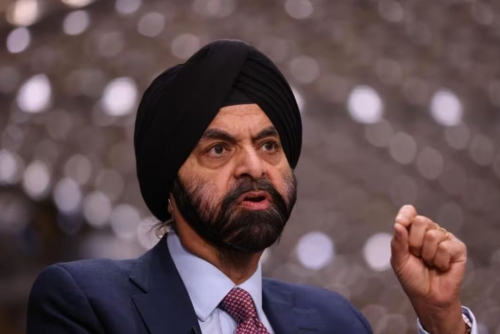Global uncertainty will ‘certainly’ hit growth: World Bank president
AFP | Washington
Email : editor@newsofbahrain.com
The uncertainty kicked up by Donald Trump’s stop-start tariff rollout will undoubtedly hit growth, the president of the World Bank said yesterday, ahead of next week’s semi-annual meeting of global financial leaders in Washington.
“Uncertainty and volatility are undoubtedly contributing to a more cautious economic and business environment,” Ajay Banga told reporters, alluding to the market turbulence unleashed by the new US administration’s tariff policy.
This uncertainty would “certainly” cause slower growth than previously anticipated, he added during the virtual event.
The World Bank and International Monetary Fund’s (IMF) Spring Meetings kick off on Monday, with the Bank keen to promote its agenda to drive job creation in developing and emerging market economies.
But the gathering of finance ministers and central bankers will take place against a challenging international backdrop, with US President Donald Trump’s tariff policy threatening to derail economic growth in many parts of the world.
Since taking office in January, the US president has imposed 25 percent levies on several sectors including, autos, steel and aluminum, as his administration seeks to redress what it says is an unfair trading relationship with the rest of the world.
The White House also imposed a new “baseline” tariff of 10 percent on most countries, and announced higher import taxes on dozens of trading partners, only to then temporarily roll many of them back.
China -- America’s third-largest trading partner -- has been hit with a barrage of new tariffs totalling 145 percent overall. Beijing, in turn, has announced retaliatory tariffs of 125% on US goods.
‘The right questions’
The United States is the top shareholder at the World Bank Group, and has historically been a key driver of policy at the Washington-based institution, which has been led by a US citizen for most of its history.
Shortly before leaving office, Joe Biden’s administration committed the United States to $4 billion in new funding for the World Bank’s agency that leverages donor funds to provide loans and grants to some of the world’s poorest countries.
The Trump administration has so far refused to commit to that $4 billion figure, raising questions about how much money it plans to contribute to the World Bank and other international financial institutions such as the International Monetary Fund (IMF).
Speaking on Wednesday, Banga indicated that the Bank would make do with a smaller budget if the United States did not provide funding at the same level as before, but that he still hoped Washington would come around.
“We’re having a constructive dialogue with the US administration,” he said. “I don’t know where it’ll end, but I’ve got no problem with the dialogue I’m having.”
“They’re asking the right questions, and we’re trying to give them the right answers,” he added.
Related Posts

